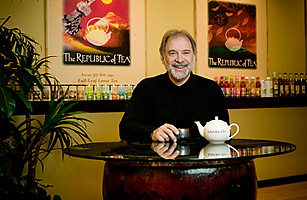
Ron Rubin, CEO of Republic of Tea
At the end of 2008, as the economy imploded, companies big and small went on a slash-and-burn expedition when it came to employees and their benefits. As the crisis deepened, Ron Rubin, CEO of the Republic of Tea, sat in his office and asked himself, What more can we do to help our ministers? In the somewhat idealistic world of Republic of Tea, "minister" is company parlance for "employee" (customers are "citizens," and retailers are "embassies"), and his answer — expand their benefits — was as unexpected as the question that prompted it. Within weeks, the Republic initiated a program, dubbed Healthy Ministry, dedicated to improving the health, physical fitness and well-being of its 100 employees.
A slate of ongoing educational and activity programs were introduced at the firm's Novato, Calif., headquarters and its Nashville, Ill., warehouse and back-end facility. A full-time nutritionist was brought on board, and on-site health screenings, along with individual counseling, were launched. Employees got a $500 credit for gym memberships and other external health plans like Weight Watchers. A workday walking program encouraged employees to take 10-to-15-minute strolls. To bolster the effort, a team from New Balance outfitted individuals with $125 shoes.
Weird? Silly? Maybe, but Rubin, who prefers the title Minister of Tea, subscribes to the idea that if you take care of your employees, they will take care of your business. "We felt if we had this program, we could change some lives and service our customers better," he says.
Rubin considers investing in his employees' well-being as simply good business practice. "Having a commitment to the health care of your employees is really a make-or-break issue for a company," says Rubin, who took over the firm in 1994, two years after it was founded. "Especially for a small business, it's a wonderful opportunity."
The privately held purveyor of premium organic and exotic teas already offered a generous set of benefits, including health and dental coverage, a 401(k) plan, day care and $2,000 college scholarships for employees' children. The company viewed the Healthy Ministry program as an opportunity to push its competitive advantage. "This is innovative, crazy and future-thinking," says small-business expert Dennis Ceru, who heads Strategic Management Associates, a consulting firm in Wellesley, Mass. "Salary, of course, matters, but something feel-good connects us as humans, especially in this current environment of cutbacks, scarcity and parsimonious behavior."
The Republic of Tea has built a brand based on a healthy lifestyle and burnished its reputation through customer service. One year and 100 pairs of sneakers later, the company calls the program a success. Participation has climbed to 100%, efficiency of order processing is up 11%, overall order-accuracy rates have increased 7%, and absenteeism is down. Employees have walked 11,125 miles (17,900 km). Less mathematical but no less measurable, a new enthusiasm permeates the Republic, employees say.
While the company's revenue, in excess of $20 million, has slowed from the double-digit growth it saw from 2003 to 2008, Rubin says he would not consider peeling back benefits. "I say, Do the reverse. If we have really healthy ministers, we can serve our customers better. They buy more of our tea, and we will be a stronger company. It's during a downturn when you want to get aggressive."
Rubin had no easy walk to get to this point. Paying off seven figures' worth of debt took "six years, three months and 15 days," he says. Now "instead of paying the bank interest, we can use our resources in a different way." As Rubin ponders this, his staff is working on enhancing the Healthy Ministry program — and the entire company is set to be outfitted with its second set of New Balance sneakers.